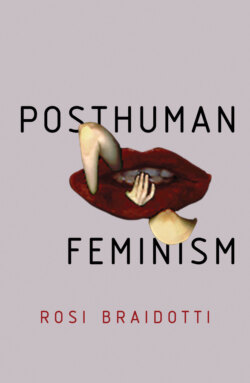Читать книгу Posthuman Feminism - Rosi Braidotti - Страница 20
Chapter 2 The Critical Edge of Posthuman Feminism
ОглавлениеA wild patience has taken me this far.
Adrienne Rich, 1981
The overview and assessment of feminist traditions critical of humanism that were presented in the previous chapter indicate that the feminist movement has produced dominant subjects functional in the management of potestas, the dominant and restrictive face of power. But it has also engendered transformative subjects, driven by potentia, the transformative and subversive face of power. In both cases feminism combines critique with creativity, politics with the imagination, and material cartographies of the present with speculative anticipations of the future. In the posthuman convergence today, the feminist strands can also be coded in terms of different modes of relation to power in their ‘neo’ appearances. A majoritarian corporate branch – neoliberal feminism – is by now subsumed into the political economy of advanced capitalism, which its neo-socialist counterpart opposes dialectically.
From a posthuman perspective, neoliberal and neo-socialist feminisms share some specular similarities and striking resemblances despite their manifest differences. Both variants are aligned on dominant humanist ideas of ‘Man’ as the motor of human history and evolution. This positions women firmly as the second sex and feminist emancipation as the project that seeks equality, by adjusting or overthrowing power relations within this dominant paradigm. Moreover, they are both anthropocentric, though in different ways: neoliberal feminists because they tend to naturalize capitalism and universalize liberal individualist exceptionalism,1 and neo-socialist feminists because they do not grant political agency to environmental non-human factors and translate them back into socio-economic inequalities indexed almost exclusively on the needs of humans. Thus, an active environmental awareness is dimmed in the neoliberal frame by universalizing the individual and in the neo-socialist mindset by an entrenched bias in favour of the socio-cultural pole of the nature–culture divide.
Of course, their strategies differ: the neoliberal’s unshakeable belief in the self-regulating force of the capitalist market economy is echoed by the neo-socialist’s equally passionate conviction that the capitalist system is destined to break down because of its deep contradictions. While they are both single-minded about identifying capitalism as the defining feature of the current socio-economic model of the state, they react to it antithetically. Where the liberal feminists rush to embrace it, the socialist ones labour to eliminate it.
In a posthuman feminist perspective, however, both variants of feminism fail to tackle the specific features of contemporary, cognitive and technology-driven capitalism. The opportunistic boundary-breaking nature of capitalism is a crucial feature if we want to understand its power. All the more so as a residual form of humanism has returned with a vengeance through the influential transhumanist movement. I will discuss transhumanism critically in the last part of this chapter. But first I will tackle aspects of advanced capitalism that humanist forms of feminism fail to address, such as the neo-colonial order of migration, innovative technologies and biopolitics of life as capital. As capitalism has mutated into an information-processing system, to miss or underestimate that mutation is a cartographic and political error of great consequence for the future of feminist humanisms. In this chapter I argue that posthuman feminism offers firstly a relevant critique of neoliberal and neo-socialist versions of feminism today, and secondly a more adequate reading of the fractures and paradoxes of the posthuman convergence. It is therefore both urgent and necessary.
